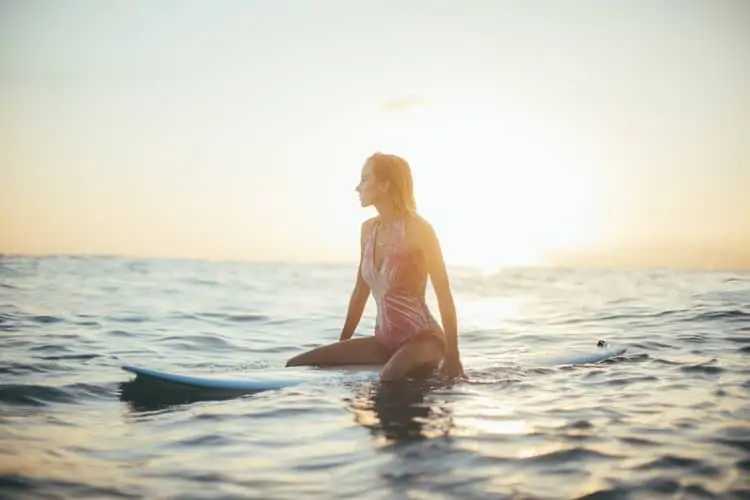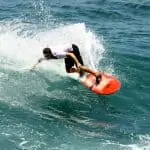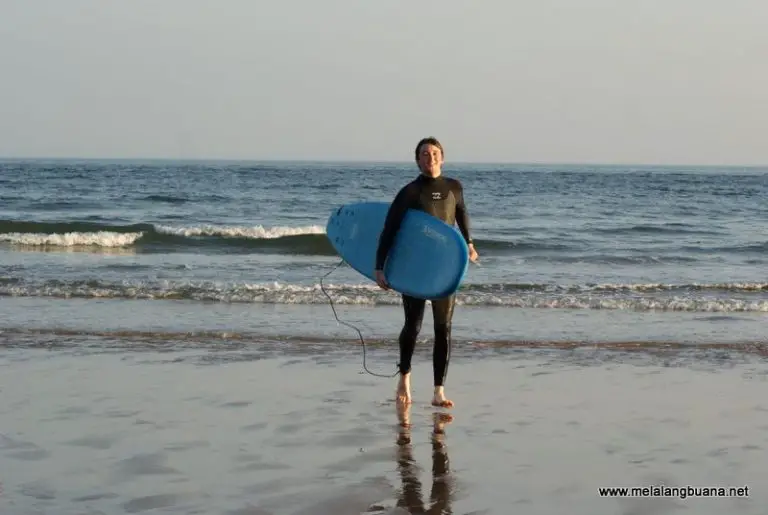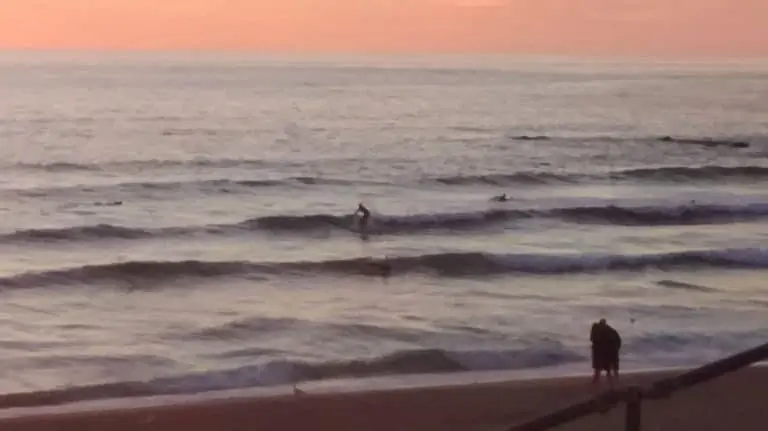Can You Learn to Surf at Any Age? (Yes + How)
Learning to surf is fun. You’ve heard this one before, and if you’ve got more than a few decades under your belt, you’re probably thinking ‘Yeah but how about when your knees can’t stand humidity’ or ‘I’m not in perfect physical shape, surely I can’t learn to surf?!’
The good (actually, the great) news is yes, you can learn to surf when you’re older, and actually, people of all ages, from toddlers to retirees, can take their first steps on a surfboard. Of course, you need the right conditions.
- If you’re still wondering whether it’s a good idea to start surfing at your age, here are some of the answers you’ll find in this article:
- Can old people learn to surf? Yes, if they have a moderate level of physical fitness and are flexible enough to stand up from lying down. Older surfers benefit from conditions like warmer temperatures and weather. Always check with your physician regarding your fitness in case you’re in any doubt.
- How old should you be to start surfing? The best surfers in the world learned as they were young kids but adult beginners can still become very skilled. The younger the easier, but older adults even into their 70s can learn to surf.
- Is surfing hard to learn? The basics can be covered pretty quickly but it takes a ton of practice to become a real expert. If you want to get a better idea, you can learn to ride a whitewater wave and surf independently in the span of just 2-4 classes.
- However, you will need to practice for a long time to master the sport. Check out my specific time estimates for how long it takes to learn to surf here for more!
- What are the best conditions to learn surfing? 1-2 ft waves and calmer weather conditions are best. It’s also ideal to choose a board that is 2 feet longer than you are tall. But most importantly, you’ll need to get out there wanting to have fun, fool around a little, and be ready to paddle lots!
The Ideal Age to Start Surfing
There’s no such thing as the “ideal” age to learn to surf. You can learn when you’re a baby and your parents take you on the board with them or start surfing in your 40s, 50s, right through to your 70s!
Some of the world’s best surfers are still competing even though they’re well beyond their 30s. Kelly Slater, for example, holds 11 world surfing championships and turned 48 in February 2020. However, it’s worth noting that he did start surfing at a young age, just in case you’re looking to turn pro in middle age! (Just kidding :D).
Competitive surfers are introduced early to the sport and it’s not uncommon to be riding in competitions at age 10. Children as young as 4 and 5 can play around with boards and water (the help and supervision of a professional or truly experienced surfer are key.)
However, older beginners can still have lots of fun and enjoying their time in the ocean while also impressing some of the young ‘whippersnappers’ out in the surf!
How to Learn to Surf when You’re Older
So, are you convinced yet that you can learn how to surf at any age? Let’s find out the key points to learn safely and successfully when you’re older:
- Make it fun
- Attitude is everything. If you’re not enjoying the experience, you probably won’t repeat it. Create the conditions for it to be a pleasant, fun, safe, and stress-free journey.
- Find the right water temperature
- Surfing in freezing-cold water isn’t just annoying for most, it also makes your movements harder because your joints, muscles, and bones are not experiencing optimal conditions. If you can’t learn to surf in August or during your summertime, at least find a good wetsuit that will help you protect them.
- Work on your flexibility
- If you find yourself being particularly tired and sore after every class or learning session, you may benefit from improved flexibility. Warm-up before going in and consider stretching and even trying yoga, pilates or general physical exercise in your spare time.
- Improve your physical fitness
- You absolutely don’t have to be a bodybuilder to get on a board. However, you must be able to swim comfortably and fit enough to paddle. Soreness, especially at the beginning, is normal at all ages. But if you find yourself struggling and often out of breath, consider improving your overall fitness with lifestyle changes and gentle workouts.
- Use the right gear
- It’s not only about the wetsuit. A light and unpredictable board can do great tricks but can also be very challenging to handle at the beginning. Start out with a larger and softer beginner board that will make you feel more in control.
The above key points will definitely help older surfers, but those who are wondering ‘can you learn to surf in your 30s and 20s?’ will benefit from them too.

How Hard Is It to Learn Surfing?
As mentioned, surfing is supposed to be fun. If it starts feeling like a job, you’re guaranteed to give up pretty quick.
Well, I’ve got great news for you: starting surfing isn’t hard, especially if you take a few classes or have a friend helping you out in the beginning. The basics are very easy to learn and most people can stand on their board from the first sessions.
The reward you’ll get from the pretty smooth initial learning curve will feel fantastic and give you the motivation to jump back in the water and get better.
Some people find it harder to get past the beginner level and become intermediate surfers. That’s when commitment makes the difference. Go in with a positive attitude and the wish to have fun and you’ll see the results.
Remember: surfers are a tribe of free spirits. Ask for help and you’ll get plenty of advice to take you to the next level.
How to learn surfing by yourself
Learning how to surf without taking one class is not unheard of. In fact, it’s pretty much the norm for those who grow up by the beach. With the right conditions and safety precautions, it’s possible not only to start out but also to become pretty skilled.
But can you learn to surf by yourself when you’re older? Just like with any age, the key is comfort and safety. Here is some advice for you:
- Choose patrolled beaches or fairly busy waters where fellow surfers can help you out in case you need it
- Start out with smaller waves and calm weather conditions
- Ask a friend to tag along
Of course, before leaving, be sure to check out my step-by-step guide to teaching yourself to surf! It can be done, but is much faster if you know how, so let me show you the path!



